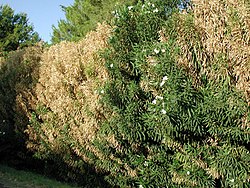Oleander
Oleander, Nerium oleander,[1] is a poisonous shrub. It is commonly used in gardens because of its pink colored flowers.[2][3] Nerium oleander is native to northern Africa, the eastern Mediterranean basin and southeast Asia. Oleander prefers dry, warm climates and may naturalize in such areas.[4] Recently, scientific studies on cardenolide oleandrin show that it may be used to prevent mutagenesis.[5]
| Oleander | |
|---|---|

| |
| Nerium oleander in flower | |
| Scientific classification | |
| Kingdom: | |
| Division: | |
| Class: | |
| Order: | |
| Family: | |
| Genus: | Nerium L.
|
| Species: | N. oleander
|
| Binomial name | |
| Nerium oleander | |
Oleander Media
Infected with X. fastidiosa in Phoenix
An Oleander, an 1882 painting by Lawrence Alma-Tadema.
Variegated variety
Oleandrin, one of the toxins present in oleander
Oleanders by Vincent van Gogh
Cultivated, Galveston
References
- ↑ Flora of China
- ↑ Osterloh J, Herold S, Pond S. Oleander interference in the digoxin radioimmunoassay in a fatal ingestion. JAMA 1982; 247: 1596-7.
- ↑ Zhao M. et al. 2007. Bioactive Cardenolides from the Stems and Twigs of Nerium oleander. J. Nat. Prod., 70, 1098 -1103
- ↑ culture conditions
- ↑ Manna SK. et al. 2000 Oleandrin Suppresses Activation of Nuclear Transcription Factor- B, Activator Protein-1, and c-Jun NH2-Terminal Kinase Cancer Research 60, 3838-3847









